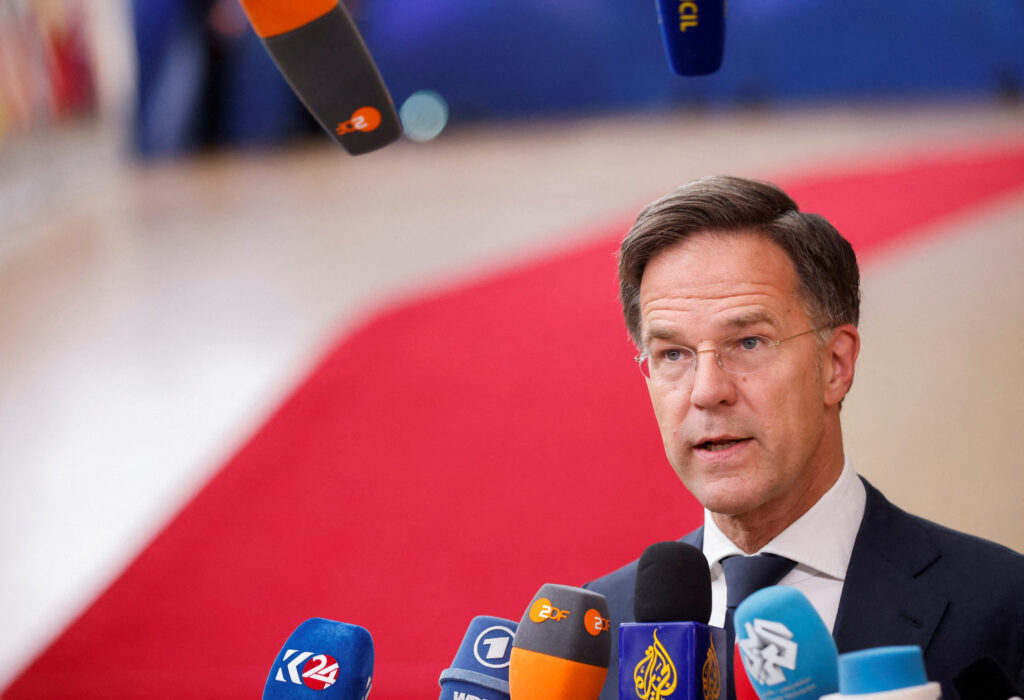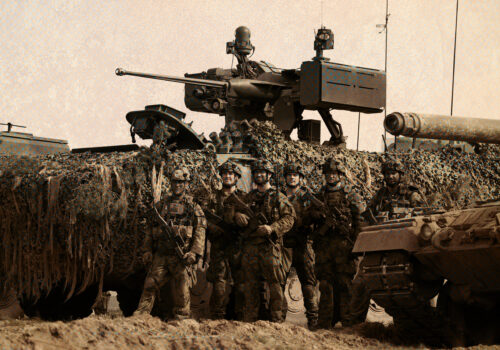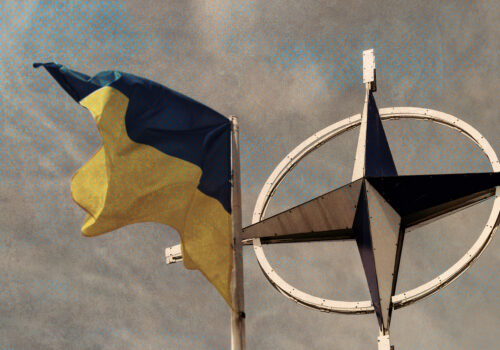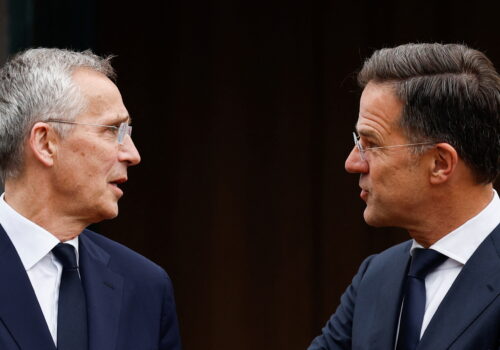Experts react: Dutch Prime Minister Mark Rutte will be NATO’s next secretary general. How will he lead the Alliance?
NATO’s Dutch tilt is official. After a seven-month campaign, outgoing Dutch Prime Minister Mark Rutte received unanimous approval from all thirty-two NATO member states to become the Alliance’s next secretary general. Rutte won his last remaining necessary endorsement from Romania on Thursday. A staunch advocate of military aid for Ukraine with a political reputation as a conservative consensus-builder, Rutte will take office in early October after current Secretary General Jens Stoltenberg steps down. How will Rutte navigate the war in Ukraine, efforts to bolster European security, and an upcoming US election with massive implications for the future of the Alliance? Below, our experts reveal the answers.
Click to jump to an expert analysis:
Philippe Dickinson: Rutte must keep the Alliance unified to finish his predecessor’s job
Rachel Rizzo: Rutte could be the key to ‘Trump-proofing’ the Alliance
Dominykas Kaminskas: Rutte has an outstanding track record, but he has ‘a mammoth task’ ahead of him
Rutte must keep the Alliance unified to finish his predecessor’s job
History will look kindly on Stoltenberg’s stewardship of NATO. Throughout his ten years as secretary general, he has navigated major shifts in geopolitics to imbue NATO with renewed purpose and direction. But how NATO navigates the challenges of the next decade will determine the long-term future of the world’s most successful alliance.
The in-tray for Rutte, the Dutch prime minister since 2010, is daunting: reinforcing defense and deterrence across the Alliance in the face of a hostile and bellicose Russia, helping Ukraine to defeat Russia and welcoming Kyiv into the Alliance, and establishing NATO’s role in dealing with the rising challenge posed by China. And he must manage these priorities all while evolving the Alliance to keep up with fast-paced technological change and without neglecting NATO’s counterterrorism and crisis management responsibilities.
But the preeminent challenge is a political one. Rutte will take the reins of NATO at a time of significant political uncertainty across the Alliance. The new secretary general will have to manage whatever configuration of leaders the electorates in Europe and North America choose in the coming months. From his many years in Dutch politics and on the international stage, Rutte is an adroit balancer of political relationships. Much has been made about his role as a “Trump whisperer,” and it is this political savvy that helped him secure the job. This political savvy will be put to the test to an unprecedented extent in the years ahead. How he handles that test will determine whether he completes the good work of his laudable predecessor.
—Philippe Dickinson is the deputy director of the Transatlantic Security Initiative within the Atlantic Council’s Scowcroft Center for Strategy and Security and a former career diplomat for the United Kingdom.
Rutte could be the key to ‘Trump-proofing’ the Alliance
At last, NATO allies are poised to agree on Rutte as the Alliance’s next secretary general. This decision has been a long time coming, as allies have extended Stoltenberg’s term four times by unanimous consent.
Rutte will bring a wealth of pragmatic governance experience to his role as the new secretary general. Nicknamed “the Trump whisperer,” Rutte’s leadership of NATO comes at a critical time, as he will assume the position less than a month before the US presidential election. Should Donald Trump, famously critical of NATO and European “free riders,” win a second term as US president, allies feel confident that Rutte is the key to Trump-proofing the alliance. He’s seen as cool, calm, and collected. He knows how to handle big egos, he’s worked with Trump before (even praising him at times), and he understands the need for European allies to increase their share of the burden of European security.
Finally, Rutte has demonstrated strong Dutch support for Ukraine, including by sending F-16 fighter jets to help Kyiv fend off Russia’s brutal assault. So will the Alliance look different under Rutte’s leadership? His predecessor, Stoltenberg, is known as a master of diplomacy, deftly handling the now thirty-two-strong Alliance so that it speaks with one voice, a crucial art given the complex geopolitics both within and beyond Europe’s borders. We should expect Rutte to be skilled at this as well. After all, he’s led his country as prime minister for the last fourteen years.
—Rachel Rizzo is a nonresident senior fellow with the Atlantic Council’s Europe Center.
Rutte has an outstanding track record, but he has ‘a mammoth task’ ahead of him
Rutte will take office at a decisive moment for NATO. With a lot of talk about unity surrounding the Alliance’s seventy-fifth anniversary and the upcoming summit in Washington, it’s important to not only project it, but to ensure it. It’s hard to think of anyone who would be better fit for this task than Rutte, his already-outstanding track record again confirmed by getting the thirty-two allies to sign off on his candidacy.
Make no mistake, this will still be a mammoth task, even for someone with his experience. Despite all the talk about NATO being the strongest, the largest, and the best in so many different ways, it is also the most diverse it has ever been. Rutte can be very pragmatic, but at a time when the rules-based order is under serious threat, NATO requires leadership that will have to go beyond what everyone can agree on. We know the Dutch prime minister can find consensus when it’s difficult, but whether he will be able to get allies to make sacrifices and decisions that they might not otherwise be comfortable making remains to be seen.
—Dominykas Kaminskas is a visiting fellow with the Transatlantic Security Initiative.
NATO’s adversaries will see it close ranks around a new leader at the Washington summit
Stoltenberg gave a master class in how to keep the Alliance together during both political turbulence and war. He will hand off this legacy to Rutte, the seasoned Dutch leader who must now carry it forward and make it his own. To keep NATO together in time of war takes a strength of character that Rutte has in abundance and a political savvy that will help him work over, around, and through obstacles most leaders never have to confront. In this year, Rutte needs the full support not just of the allies, but of the International Staff and the NATO military authorities as well.
Leadership change at NATO is hard, especially after a tenure as long as Stoltenberg’s. But the July summit is the time for NATO’s adversaries to see the Alliance closing ranks behind one of Europe’s most seasoned leaders as we also say farewell to one of NATO’s greatest secretaries general.
—James J. Townsend Jr. is a senior advisor in the Scowcroft Center’s Transatlantic Security Initiative.
Further reading
Thu, Jun 20, 2024
Rethinking the NATO burden-sharing debate
New Atlanticist By Valbona Zeneli, Philippe Dickinson
As more allies cross the threshold of spending 2 percent of their gross domestic product on defense, it’s time for the conversation to evolve.
Mon, Jun 10, 2024
Building the bridge: How to inject credibility into NATO’s promise of membership for Ukraine
New Atlanticist By Ian Brzezinski
Ukraine’s bridge to NATO membership must be built in ways that institutionalize its integration into the Alliance’s structures—starting now.
Thu, Mar 7, 2024
What kind of leader is required for the future of the NATO Alliance?
New Atlanticist By Timo S. Koster
Dutch Prime Minister Mark Rutte is the clear front-runner to be the next secretary general, but his candidacy is not quite assured.
Image: Dutch Prime Minister Mark Rutte speaks to the media on the day of a European Union leaders informal summit in Brussels, Belgium June 17, 2024. REUTERS/Johanna Geron.






